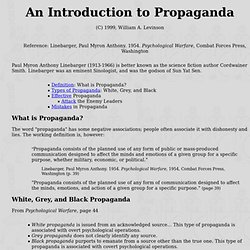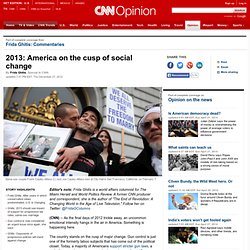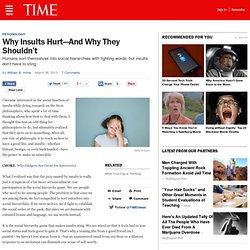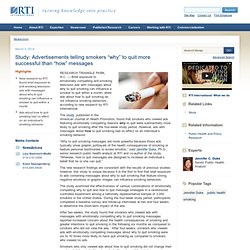

Job interviews reward narcissists, punish applicants from modest cultures : science. An Introduction to Propaganda. (C) 1999, William A.

Levinson Reference: Linebarger, Paul Myron Anthony. 1954. Psychological Warfare, Combat Forces Press, Washington.
Debate. Game Theory. Getting Peoples Attention. Social Media. Trolls & Reviews. Reporting. 2013: America on the cusp of social change. Same-sex couple Frank Capley-Alfano (L) and Joe Capley-Alfano kiss at City Hall in San Francisco, California, on February 7.

Frida Ghitis: After years in which conservative views predominated, U.S. is changingGhitis: 2013 should see impact of support for progressive tax rates, same-sex marriageGun control is now considered an urgent issue once again, she saysGhitis: Opponents of progressive policies will stand against change Editor's note: Frida Ghitis is a world affairs columnist for The Miami Herald and World Politics Review. A former CNN producer and correspondent, she is the author of "The End of Revolution: A Changing World in the Age of Live Television.
" Follow her on Twitter: @FridaGColumns (CNN) -- As the final days of 2012 trickle away, an uncommon emotional intensity hangs in the air in America. The country stands on the cusp of major change. Frida Ghitis CNN Opinion contributors weigh in on what to expect in 2013. Taxes: Getting Your Money's worth Obama's pot problem. Why working-class people vote conservative. Why on Earth would a working-class person ever vote for a conservative candidate?

This question has obsessed the American left since Ronald Reagan first captured the votes of so many union members, farmers, urban Catholics and other relatively powerless people – the so-called "Reagan Democrats". Isn't the Republican party the party of big business? Don't the Democrats stand up for the little guy, and try to redistribute the wealth downwards? Many commentators on the left have embraced some version of the duping hypothesis: the Republican party dupes people into voting against their economic interests by triggering outrage on cultural issues. "Vote for us and we'll protect the American flag! " Kind Children Happier and Popular With Peers: Study : health-medicine : NatureWorldNews. Dec 31, 2012 06:29 AM EST A new study claims that kind children are happier and more popular with their peer groups.

A team of researchers at the University of California, Riverside, carried out an experiment with 400 children in the age group of nine to 11, from Vancouver elementary schools in Canada. The children were split into two groups. One group was asked to perform and note down three acts of kindness every week for a period of four weeks. Ten Surprising Facts About Rejection. Why Insults Hurt—And Why They Shouldn't. I became interested in the social function of insults while doing research on the Stoic philosophers, who spent a lot of time thinking about how best to deal with them.

I thought this was an odd thing for philosophers to do, but ultimately realized that they were on to something. After all, one role of philosophy is to teach us how to have a good life, and insults—whether blatant, benign, or even backhanded—have the power to make us miserable. (MORE: Why Gadgets Are Great for Introverts) What I realized was that the pain caused by insults is really just a symptom of a far more serious ailment: our participation in the social hierarchy game. We are people who need to be among people. It is the social hierarchy game that makes insults sting. Those playing the social hierarchy game try to score points by insulting others, who respond with counter-insults. Teaching kids to share: Giving choices rather than rewards is better, study says. When it comes to getting preschoolers to share their toys, a new study finds that giving them a choice to share, rather than a reward, helps them share more with others in the future.

In new evidence announced Monday, investigators from Cornell University in the U.S. conducted a series of experiments on 72 preschool-aged children, from three to five years old. Findings suggest that sharing when given a difficult choice leads children to see themselves in a new, more beneficent light, researchers said. We don’t really want to hear new music. WASHINGTON U. – ST.

LOUIS / U. Effective messages in vaccine promotion: When it comes to anti-vaxxers, there are none. Photo by Ed Oudenaarden/AFP/Getty Images While some false beliefs, such as astrology, are fairly harmless, parents who believe falsely that vaccination is dangerous or unnecessary for children present a real public health hazard.

How Do Good Ideas Spread? Why do some innovations spread so swiftly and others so slowly?

Consider the very different trajectories of surgical anesthesia and antiseptics, both of which were discovered in the nineteenth century. Telling smokers “why” to quit more successful than “how” messages. RESEARCH TRIANGLE PARK, N.C. — Brief exposure to emotionally compelling anti-smoking television ads with messages about why to quit smoking can influence a smoker to quit within a month, while ads about how to quit smoking do not influence smoking behaviors, according to new research by RTI International.

The study, published in the American Journal of Health Promotion, found that smokers who viewed ads featuring emotionally compelling reasons why to quit were substantially more likely to quit smoking after the four-week study period. However, ads with messages about how to quit smoking had no effect on an individual’s smoking behavior. “Why to quit smoking messages are more powerful because those ads typically show graphic portrayals of the health consequences of smoking or feature personal testimonies to evoke emotion,” said Jennifer Duke, Ph.D., senior research public health analyst at RTI and co-author of the study.